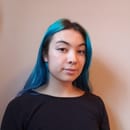My name is Rie, pronounced re-ay and the kanji (alphabetical characters or symbol) in Japanese means plenty of wisdom. For me, it is a constant reminder of my heritage, my identity, and the flux I live in as a mixed-race person.
I was born in Japan and moved to Canada when I was six. My mom’s Japanese, and my dad’s Canadian. We moved for a number of reasons.
One reason was that my parents wanted better future opportunities for my sister and I.
My English wasn’t very good, and my dad’s Japanese wasn’t great, so there was a fast-growing language barrier between us.
I sometimes wonder what would have happened if we had stayed in Japan.
But here we are.
I grew up in a small town in British Columbia. In my high school grad class, there were about seven other Asian or mixed students. The majority of us were grouped as the ‘Asian kids.’
I don’t think any of us comprehended the microaggressions and racism we faced back then. But I have stayed close with some of my friends from high school, and in the last year, in the wake of social upheaval and a great amount of learning on our end about racism, we could put names to the negative experiences and uncomfortable emotions we’d had.
But the Asian-Canadian experience is multi-faceted, and Asia is not the monolith that it is portrayed to be in media. Even in my small Asian community in high school, there was a girl who was adopted, others were mixed like myself, and others were second or third-generation immigrants. There were Vietnamese, Chinese, Japanese, Indian. Yet we were all grouped together, always slightly different from everyone else.
Since high school, I have moved to a larger city where there is a much larger Asian community. However, it was like the inverse happened; I was a foreigner in these spaces as well. I enjoy trying new foods, and my comfort food will always be noodles or rice. But in Asian restaurants, I tend to stick out as one of the few white people.
Every day, there are gentle reminders that I live in this flux, not white but not Asian. When I have to fill out forms that ask me to describe my background, but I can only select one box among Asian, white, Black, Latino, Indigenous, Other. Am I other?
But also, I bear the burden of both. I am trying to unlearn my internalized bias and acknowledge my privilege as a white person. And at the same time, I am trying to heal my own wounds and experiences of racism and ignorance.
My heart aches for the Asian community that has experienced an increased rate of Asian hate over the past year. I worry about my own mother, who works at a grocery store. But here’s another nuanced thing about Asian hate: it takes a lot of violence to make the news or for others to take notice because many Asians have learnt English as a second language. If you yell racial slurs at elderly Asian folks, there is a chance they won’t understand. Even my mother doesn’t always understand the dual meanings or English sayings she hears at the grocery store, which worries me that she has experienced racism but doesn’t fully understand. Much like I didn’t understand what I had experienced growing up.
This isn’t to discount or take away from the pain and marginalization faced by other communities. Comparative oppression or the oppression olympics leads us to believe that it’s about who is the most oppressed and that some have more valid experiences than others. Which, to an extent, is true—I will never experience the injustice faced because of my privilege of being half white and looking very white. But it would be erasing so much of my experience growing up if I ignored my Asian heritage and the ignorance I have faced. Comparative oppression also further alienates various minorities, when really, we should be looking to stand up to the common oppressor and build one another up.
Racism is an oppressive system based on race, meaning that each race experiences racism most likely different, but it all stems from the same space of hate. For my fellow white folks, let’s create space and allow for more Asian representation and understanding. Let’s call out the hatred and ignorance when we see it.
I hope that my fellow Asians can find a space where their thoughts, concerns, and experiences are validated. You have a right to question what it means to be Asian in North America. You have a right to be proud of your racial and cultural background. You belong no matter where you are.



